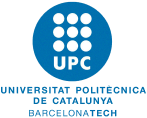What is Self-Management?
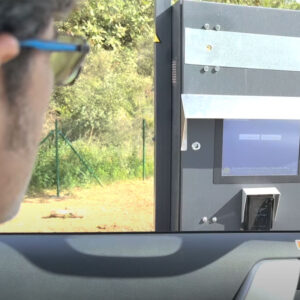
Self-management is the operating system implemented in a EVUP Network that grants users control and responsibility for all their operations without external supervision, allowing an accurate record of production and waste management.
In the context of a EVUP Network, this means that each user intending to discard or load materials can manage all the related operations. The gardener is responsible for the entry, discarding or loading, payment for the use of the station, and exit. The role of the supervisor is replaced by advanced technology.
What are the Objectives?
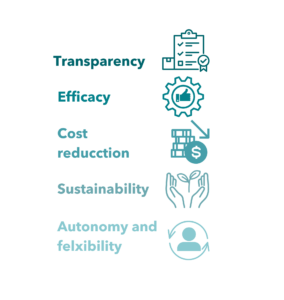
The objectives of self-management at EVUP Network are diverse and essential for the proper functioning and sustainability of the station:
Operational Efficiency: Optimize the processes of collection, classification, and treatment of waste to ensure maximum efficiency, reducing the time and resources required for these tasks.
Cost Reduction: Minimize costs associated with waste management by leveraging advanced technologies and efficient processes to reduce operational expenses.
Environmental Sustainability: Promote practices that reduce the environmental impact of pruning and gardening waste, ensuring operations are environmentally friendly and contribute to the protection of natural resources.
Autonomy and Flexibility: Enable independence in decision-making, allowing the station to respond quickly to changing circumstances and operational needs without relying on external parties.
Transparency and Accountability: Ensure transparency in all operations and take responsibility for the results, maintaining credibility and trust among stakeholders.
What Elements Enable Self-Management?
Several technologies are key to enabling the self-management of waste stations:
- Image Detection Technologies: Identify materials being discarded and detect fraudulent use of the station or potential environmental harm.
- Big Data Systems in Waste Management: Track and analyze data regarding users, companies, and waste operations, offering insights into who is performing actions and where operations typically take place.
- APIs for Transparency: Ensure the accuracy and immutability of all collected information, providing transparency in waste management operations.
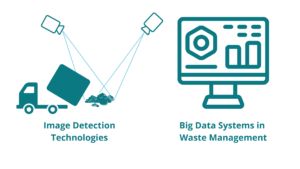
Methodology for Implementing Self-Management
The following steps are involved in implementing the self-management system:
- Data Collection: Use electronic scales and image detection sensors to gather data on incoming waste.
- Data Analysis: Implement waste management software and big data platforms to process and analyze the collected data.
- Real-Time Monitoring: Utilize IoT sensors to monitor waste conditions and air quality in real time.
- API Implementation: Develop an API system to securely and immutably record and communicate all transactions and movements of waste.
- Pilot Testing and Evaluation: Conduct pilot tests to validate the technologies and evaluate their effectiveness in terms of classification, treatment, and valorization of waste.
Expected Results
The expected outcomes of this research include several key improvements in pruning and gardening waste management:
- Improved Waste Classification: Image detection systems will enhance the accuracy and effectiveness of waste classification, ensuring more precise separation of materials and preventing inappropriate items from being discarded.
- Increased Operational Efficiency: Integrating advanced technologies like big data and IoT will reduce operational costs and improve resource management, maximizing productivity at the station.
- Transparency and Traceability: API technologies will improve transparency and traceability by securely recording all waste transactions, boosting trust in the system and ensuring compliance with environmental regulations.
- Continuous Process Optimization: Real-time monitoring and data analysis will enable ongoing evaluation and improvement of waste collection and treatment processes, ensuring that the station remains efficient and sustainable over time.
Conclusions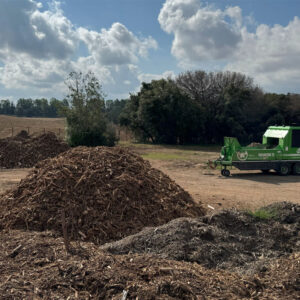
The Self-Managed EVUP is using advanced technologies—such as image detection, big data, IoT, and APIs—can result in more efficient, sustainable, and transparent management of pruning and gardening waste. These research results can serve as a model for other waste collection stations, contributing to the overall improvement of waste management practices and environmental protection.

 Self-management is the operating system implemented in a EVUP Network that grants users control and responsibility for all their operations without external supervision, allowing an accurate record of production and waste management.
In the context of a EVUP Network, this means that each user intending to discard or load materials can manage all the related operations. The gardener is responsible for the entry, discarding or loading, payment for the use of the station, and exit. The role of the supervisor is replaced by advanced technology.
Self-management is the operating system implemented in a EVUP Network that grants users control and responsibility for all their operations without external supervision, allowing an accurate record of production and waste management.
In the context of a EVUP Network, this means that each user intending to discard or load materials can manage all the related operations. The gardener is responsible for the entry, discarding or loading, payment for the use of the station, and exit. The role of the supervisor is replaced by advanced technology.
 The objectives of self-management at EVUP Network are diverse and essential for the proper functioning and sustainability of the station:
Operational Efficiency: Optimize the processes of collection, classification, and treatment of waste to ensure maximum efficiency, reducing the time and resources required for these tasks.
Cost Reduction: Minimize costs associated with waste management by leveraging advanced technologies and efficient processes to reduce operational expenses.
Environmental Sustainability: Promote practices that reduce the environmental impact of pruning and gardening waste, ensuring operations are environmentally friendly and contribute to the protection of natural resources.
Autonomy and Flexibility: Enable independence in decision-making, allowing the station to respond quickly to changing circumstances and operational needs without relying on external parties.
Transparency and Accountability: Ensure transparency in all operations and take responsibility for the results, maintaining credibility and trust among stakeholders.
The objectives of self-management at EVUP Network are diverse and essential for the proper functioning and sustainability of the station:
Operational Efficiency: Optimize the processes of collection, classification, and treatment of waste to ensure maximum efficiency, reducing the time and resources required for these tasks.
Cost Reduction: Minimize costs associated with waste management by leveraging advanced technologies and efficient processes to reduce operational expenses.
Environmental Sustainability: Promote practices that reduce the environmental impact of pruning and gardening waste, ensuring operations are environmentally friendly and contribute to the protection of natural resources.
Autonomy and Flexibility: Enable independence in decision-making, allowing the station to respond quickly to changing circumstances and operational needs without relying on external parties.
Transparency and Accountability: Ensure transparency in all operations and take responsibility for the results, maintaining credibility and trust among stakeholders.








